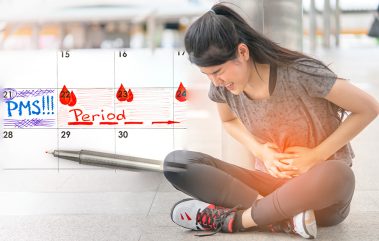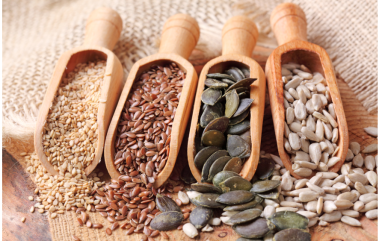Water and electrolyte balance is essential for homeostasis. It is tightly maintained by osmoregulation. The hormones Follicle-Stimulating Hormone (FSH), Luteinizing Hormone (LH), Estrogen, and Progesterone control the menstrual cycle in women. Estrogen and progesterone levels fluctuate throughout the menstrual cycle and affect osmoregulatory hormones, impacting water and electrolyte balance. Yet, studies suggest that this effect is minimal. The extent of water-electrolyte imbalance can vary from person to person, and some women may experience significant imbalance.
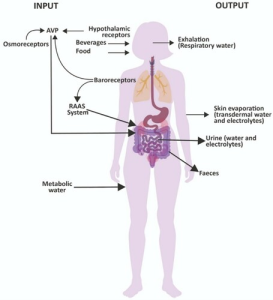
Source: Fluid and electrolyte balance considerations for female athletes
Throughout the menstrual cycle, there is a variation in estrogen and progesterone levels. Estrogen gradually increases after menstruation and peaks during the late follicular phase. This, in turn, leads to a mid-cycle LH surge that triggers ovulation. Following ovulation, progesterone levels rise for a probable pregnancy; if fertilisation does not occur, estrogen and progesterone decline, resulting in menstruation. Then a new cycle begins. Understanding how these hormone fluctuations during the menstrual cycle can impact fluid and electrolyte balance is essential for female athletes.
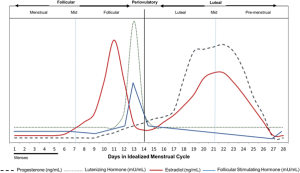
Source: Menstrual cycle rhythmicity: metabolic patterns in healthy women
Estrogen (Estradiol) has an effect on arginine vasopressin (AVP) and the renin-angiotensin-aldosterone system (RAAS). These help in regulating blood pressure and fluid balance. The level of estrogen is higher during the late-follicular phase compared to the luteal phase. A decreased level of estrogen can lead to water retention and bloating, which can affect hydration levels during exercise. On the other hand, higher levels of estrogen at the late-follicular phase result in an increase in sweat rate and cutaneous vasodilation and a decrease in extracellular fluid volume and blood pressure. This leads to an increased risk of dehydration and potentially reduced performance.

Source: Fluid and electrolyte balance considerations for female athletes
Along with its role in the menstrual cycle, progesterone also affects fluid and electrolyte balance by affecting AVP and RAAS. As the progesterone level peaks during the luteal phase, it leads to an increase in sweat threshold, a decrease in sweat rate and cutaneous dilation and may cause water retention and bloating. This can result in dehydration and an imbalance in thermoregulation.
The hypothalamus and the kidneys work towards countering the effect of change in estrogen and progesterone levels on hydration. Practising proper hydration strategies can help in the process of osmoregulation, thermoregulation, performance and recovery in female athletes. Hydration strategies that must be incorporated include:
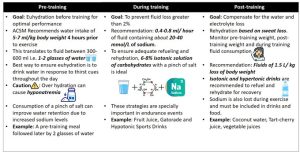
Key Points in maintaining and monitoring Hydration Status include:
- Drinking enough water to address thirst cues.
- Monitoring Sweat rate and loss.
- Monitoring Urine colour.
- If there is a provision, monitor urine-specific gravity.
- Training the gut to a particular hydration strategy during the pre-competition phase to avoid gastrointestinal distress during competition.
Some practical strategies to combat bloating during luteal and menstruation include:
- Follow the above hydration strategies to prevent dehydration, as it can cause bloating.
- Avoid carbonated drinks as high sugar and gas can worsen bloating.
- Include more whole grains, pulses, berries, citrus fruits, gourds, and green leafy vegetables to fulfil carbohydrate requirements than resorting to simple sugars and processed foods.
- Avoiding cruciferous vegetables like cabbage and cauliflower if they cause bloating in individuals (subject to individual variation).
- Avoid dairy products, as lactose can worsen bloating in some individuals.
Therefore, Female athletes should understand how their body responds to environmental conditions and their menstrual cycle to adopt proper hydration strategies to ensure health, optimal performance, and proper recovery. Consumption of appropriate amounts of fluids before, during, and after training is very important. Monitoring and adjusting the training according to the menstrual cycle can improve performance.
Stay Healthy, and Stay Hydrated!
References:
- Rodriguez-Giustiniani, P., Rodriguez-Sanchez, N., & Galloway, S. D. R. (2022). Fluid and electrolyte balance considerations for female athletes. European journal of sport science, 22(5), 697–708. https://doi.org/10.1080/17461391.2021.1939428
- Wenner, Megan & Stachenfeld, Nina. (2013). Fluid and Electrolyte Requirements for Female Athletes. 10.1201/b13743-5. – Fluid and Electrolyte Requirements for Female Athletes | 8 | Nutriti (taylorfrancis.com)
- Draper, C. F., Duisters, K., Weger, B., Chakrabarti, A., Harms, A. C., Brennan, L., Hankemeier, T., Goulet, L., Konz, T., Martin, F. P., Moco, S., & van der Greef, J. (2018). Menstrual cycle rhythmicity: metabolic patterns in healthy women. Scientific reports, 8(1), 14568. https://doi.org/10.1038/s41598-018-32647-0
- Rodriguez-Giustiniani, P., & Galloway, S. D. R. (2019). Influence of Peak Menstrual Cycle Hormonal Changes on Restoration of Fluid Balance After Induced Dehydration. International journal of sports nutrition and exercise metabolism, 29(6), 651–657. https://doi.org/10.1123/ijsnem.2019-0105
- American College of Sports Medicine, Sawka, M. N., Burke, L. M., Eichner, E. R., Maughan, R. J., Montain, S. J., & Stachenfeld, N. S. (2007). American College of Sports Medicine position stand. Exercise and fluid replacement. Medicine and science in sports and exercise, 39(2), 377–390. https://doi.org/10.1249/mss.0b013e31802ca597
Bio:
Vedashree Bhat
Masters in Sports Nutrition
Currently in my final year of Masters; I find the relationship between Biochemistry, Physiology and Nutrition very intriguing.
I look forward to help translate research into practical nutrition advice for health and performance.



